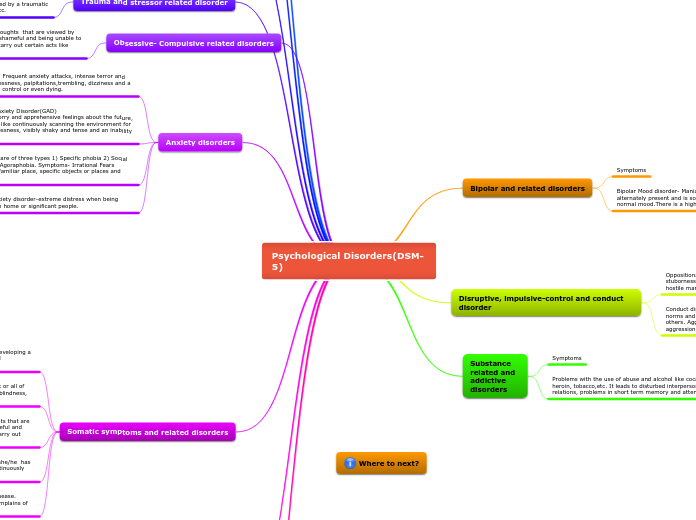Psychological Disorders(DSM-5)
Schizophrenia Spectrum and Other Psychotic Disorders
Delusion, hallucinations, inappropriate affect, alogia, blunted affect, avolition, psychomotor symptoms, catatonia,etc. Positive and negative symptoms.
Feeding and eating disorders
Anorexia nervosa- refusing to eat, exercising continually, losing large amounts of weight. starving sometimes even to death.
Bulimia nervosa- Eating excessive amounts of food and then purge his/her body of food using laxatives or diuretics or by vomiting.
Binge eating- episodes of eating out of control and eating at a very high speed than normal until she/he feels uncomfortably full.
Neurodevelopmental disorders
ADHD- Inattention and hyperactivity-impulsivity
Autism spectrum disorder- widespread impairements in social interaction and communication skills. Marked difficulties in in social interaction and communication. Unable to share experiences or emotions with others. Deviant.
Intellectual disability- below average intellectual functioning; below 70
Specific learning disorders- impairing functioning and performance in activities/occupations dependent on the related skills. problems in reading and writing or in mathematics.
Trauma and stressor related disorder
Post- Traumatic stress Disorder(PTSD)
Symptoms- Recurrent dreams, flashbacks, impaired concentration, and emotional numbing followed by a traumatic event like an accident or a natural disaster, etc.
Bipolar and related disorders
Symptoms
Bipolar Mood disorder- Mania and depression are both alternately present and is sometimes interrupted by periods of normal mood.There is a high risk of suicide.
Disruptive, impulsive-control and conduct disorder
Oppositional defiant disorder- age inappropriate amount of stuborness, irritable, defiant, disobedient and behave in a hostile manner.
Conduct disorder- age inappropriate actions, breaking societal norms and damage the personal and private property of others. Aggressive behavior like verbal aggression, physical aggression, hostile aggression and proactive aggression.
Obsessive- Compulsive related disorders
Being preoccupied with certain thoughts that are viewed by the person to be embarrasing or shameful and being unable to check the impulse to repeatedly carry out certain acts like checking, washing, counting, etc.
Substance related and addictive disorders
Symptoms
Problems with the use of abuse and alcohol like cocaine, heroin, tobacco,etc. It leads to disturbed interpersonal relations, problems in short term memory and attention
Anxiety disorders
Panic disorder- Frequent anxiety attacks, intense terror and dread, breathlessness, palpitations,trembling, dizziness and a sense of losing control or even dying.
Generalized Anxiety Disorder(GAD)
Symptoms: Worry and apprehensive feelings about the future, hypervigilance like continuously scanning the environment for dangers, restlessness, visibly shaky and tense and an inability to relax.
Phobias- They are of three types 1) Specific phobia 2) Social Phobia and 3) Agoraphobia. Symptoms- Irrational Fears towards an unfamiliar place, specific objects or places and situations.
Separation anxiety disorder-extreme distress when being separated from home or significant people.
Somatic symptoms and related disorders
Illness anxiety disorder- persistent worry about developing a disease. Worries about own health despite medical reassurance.
Conversion disorders- Reported loss of a body part or all of some basic body functions. Symptoms- Paralysis, blindness, deafness, difficulty in walking ,etc.
Symptoms- Being preoccupied with certain thoughts that are viewed by the person to be embarrassing or shameful and being unable to check the impulse to repeatedly carry out certain acts like checking, washing, counting, etc.
Somatic symptom disorder- Persistent belief that she/he has a serious illness despite medical evidence and continuously being preoccupied and worried about it.
Physical symptoms in the absence of a physical disease.
The individual has psychological difficulties and complains of physical symptoms.
Dissociative Disorders
Feelings of unreality, estrangement, depersonalisation and sometimes a loss or shift of identity.
Dissociative Amnesia-Extensive but selective memory loss that has no organic cause like an injury in head. Some people do not remember anything about their past while others forget certain events, places or people,etc. Fugue is a part of dissociative amnesia. It is the assumption of a new identity and the inability to recall the previous identity. The fugue usually ends when the person"wakes up" with no memory of the events that occurred during the fugue.
Dissociative identity disorder- Also referred as multiple personality disorder. In this a person assumes multiple identities or personalities that differ from each other and the person may not be aware of it.
Depersonalisation- dreamlike state in which the person has a sense of being seperated from both self and reality. There is a change of of self-perception and person's sense of reality is temporarily changed.
Depressive Disorders
Major depressive disorder- Change in body weight, constant sleep problems, tiredness, inability to think properly, agitation, thoughts of death and suicide, excessive guilt and feeling of worthlessness, helplessness and hopelessness.
